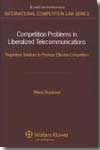Competition problems in liberalized telecommunications
regulatory solutions to promote effective competition
- ISBN: 9789041127365
- Editorial: Kluwer Law International
- Fecha de la edición: 2008
- Lugar de la edición: The Hague. Países Bajos
- Colección: International competition Law series
- Encuadernación: Cartoné
- Medidas: 25 cm
- Nº Pág.: 360
- Idiomas: Inglés

This innovative study of the role of competition law in the telecommunications industry starts from a classic perspective: While, in principle, regulation benefits social welfare and efficient allocation of resources, past regulatory experience shows that regulation can be flawed and lead to welfare harm rather than good. In the telecommunications industry specifically, inappropriately designed sector-specific remedies and regulatory delays in the introduction of new telecommunications services can hold up the development of the market towards effective competition and could incur considerable welfare losses. In addition, conventional antitrust analysis still lags behind the dynamic nature of the electronic communications markets.Milena Stoyanova sets out to establish a new understanding of the role of sector-specific regulation and competition law enforcement in the electronic communications sector, addressing such questions as the following: A* Why a new regulatory framework?A* Are sectoral regulation and competition law enforcement mutually exclusive or complementary?A* Why should electronic communications markets be regulated to conform to competition law principles?A * What does competition law add to sector-specific regulation?A* What is the relationship or proportion between regulation and competition law enforcement? An overview of the telecommunications liberalization process initiated at European Community level reveals such problems as a divergent approach of national regulatory authorities in the application of one and the same norms, inability of competition authorities to rightly assess the technicalities underlying a competition problem, and difficulty in carrying out a periodical oversight of compliance with the competition law remedies. The author discusses the legal basis and rationale for the application of the essential facility doctrine to the electronic communications sector, and argues for new regulatory responses to the emergence of collectiv






